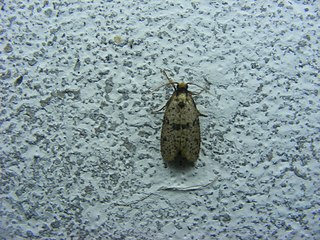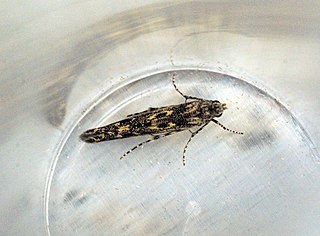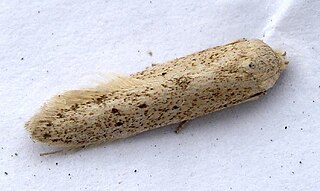
Eriocottidae or Old World spiny-winged moths is a family of insects in the order Lepidoptera whose position relative to other members of the superfamily Tineoidea is currently unknown. There are two subfamilies, Compsocteninae and Eriocottinae.

Batrachedra is the largest genus in the moth family Batrachedridae, with representatives all over the world. The early stages of most species are unknown. The genus name is derived from the Greek words batrachos, 'frog', and edra, 'seat', referring to the frog-like resting posture of the adult moths. As of 2018 at least some 114 species are known to belong to the genus.

The Blastobasidae are a family of moths in the superfamily Gelechioidea. Its species can be found almost anywhere in the world, though in some places they are not native but introduced by humans. In some arrangements, these moths are included in the case-bearer family (Coleophoridae) as subfamily Blastobasinae. The Symmocidae are sometimes included in the Blastobasidae as subfamily or tribe.

Argyresthia is a genus of moths in the family Argyresthiidae, previously treated as subfamily Argyresthiinae in the family Yponomeutidae.
Compsolechia is a genus of moths in the family Gelechiidae.

Dichomeris is a genus of moths in the family Gelechiidae erected by Jacob Hübner in 1818.
Auximobasis is a genus of the gelechioid moth family Blastobasidae. It is sometimes included in Blastobasis.

Blastobasis is the type genus of the gelechioid moth family Blastobasidae; in some arrangements these are placed in the case-bearer family (Coleophoridae) as a subfamily. Within the Blastobasidae, the subfamily Blastobasinae has been established to distinguish the Blastobasis lineage from the group around Holcocera, but the delimitation is not yet well-resolved.

Bradina is a genus of moths of the family Crambidae.

Helastia is a genus of moths in the family Geometridae erected by Achille Guenée. It is considered by some to be a synonym of Larentia. This genus was redefined and described in 1987 by Robin C. Craw. This genus is endemic to New Zealand.
Goniotorna is a genus of moths belonging to the subfamily Tortricinae of the family Tortricidae.

Megalorhipida is a genus of moths in the family Pterophoridae described by Hans Georg Amsel in 1935. Species in this genus are distributed in pantropical and subtropical climates. The species typically nests on host plants in the families Nyctaginaceae, Amaranthaceae, Fabaceae, Goodeniaceae, Asteraceae, and Verbenaceae. The generic name is often misspelled as Megalorrhipida. The species formerly placed in the genus Antarches are now considered to belong to this genus.
Auximobasis administra is a moth in the family Blastobasidae. It was described by Edward Meyrick in 1922. It is found in Peru and Colombia.
Auximobasis agrestis is a moth in the family Blastobasidae. It was described by Edward Meyrick in 1922. It is found in Pará, Brazil.
Auximobasis flavida is a moth in the family Blastobasidae. It was described by Edward Meyrick in 1922. It is found in Peru and Pará, Brazil.
Auximobasis prolixa is a moth in the family Blastobasidae. It was described by Edward Meyrick in 1922. It is found in Peru.
Auximobasis incretata is a moth in the family Blastobasidae. It was described by Edward Meyrick in 1931. It is found in Peru.
Auximobasis invigorata is a moth in the family Blastobasidae. It was described by Edward Meyrick in 1932. It is found on the Virgin Islands.
Auximobasis obstricta is a moth in the family Blastobasidae. It was described by Edward Meyrick in 1918. It is found in Guyana.
Lethata is a genus of moths in the subfamily Stenomatinae.








